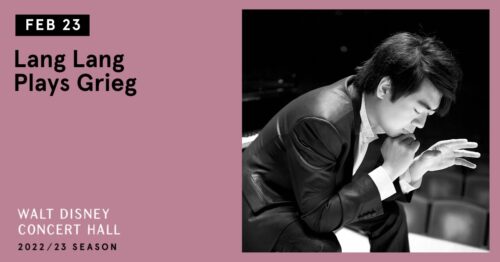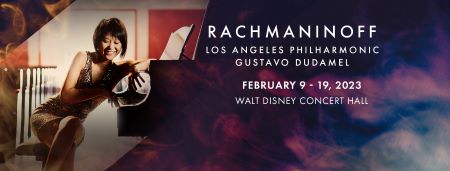 The Los Angeles Philharmonic hosted two of the most proficient and popular concert pianists this week, both of whom proved why they are considered top-tier. In an exhaustive exhibition of Rachmaninoff — four piano concertos and the Rhapsody on a Theme of Paganini — superstar pianist Yuja Wang joined Gustavo Dudamel for a two-weekend set of programs which concluded with either The Bells or Symphonic Dances. The following week, her contemporary and fellow superstar Lang Lang — led by guest conductor Otto Tausk — took Grieg’s Piano Concerto to the level of Elysium.
The Los Angeles Philharmonic hosted two of the most proficient and popular concert pianists this week, both of whom proved why they are considered top-tier. In an exhaustive exhibition of Rachmaninoff — four piano concertos and the Rhapsody on a Theme of Paganini — superstar pianist Yuja Wang joined Gustavo Dudamel for a two-weekend set of programs which concluded with either The Bells or Symphonic Dances. The following week, her contemporary and fellow superstar Lang Lang — led by guest conductor Otto Tausk — took Grieg’s Piano Concerto to the level of Elysium.
LA Phil, Yuja Wang - Disney Hall - February 12, 2023 Photo by Timothy Norris
I saw Wang attack the Piano Concerto no. 3 in D minor, and her remarkable indefatigability was on full display. And for those who wondered how she plowed through these works without breaking a sweat, know that back in January she appeared at Carnegie Hall with The Philadelphia Orchestra and conductor Yannick Nézet-Séguin for the exact same works all in one afternoon! To this day, Rachmaninoff’s virtuosic, often rhapsodic compositions captivate like few others, and she ensured that the music was as heartily felt as it was technically astounding. Let me put it this way: Yuja Wang proved herself a true monster at the keys. Fascinatingly enough, while she seems to be tougher than ever, Lang Lang has actually pulled back on his normal effusiveness.
Lang Lang. Photo by Xin Qiu.
On Thursday, Wang looked stunning in a shimmering emerald green backless mini-dress with fishnet stockings and high stiletto pump shoes. Yet for all her glitzy personal affect, Wang is a serious, introspective artist. She brought a turbocharged energy to the Intermezzo: Adagio and Finale: Alla breve sections of the Third that run headlong into each other, and I loved her sophisticated approach to the Allegro ma non tanto. She was the ultimate in skill, speed, and clarity, along with emotion that is needed to complete a great concerto. Not only did she offer a graceful rapidity and firm trajectory to Rach’s Third, but she brought out notes which normally get lost within the cascading arpeggios. And because her technique is ridiculously fluid, her pedaling is spare rather than weighty.
LA Phil, Yuja Wang - Disney Hall - February 12, 2023 Photo by Timothy Norris
Our leader, the formidable Dudamel, had already recorded the Third with Wang and the Simon Bolivar Orchestra. It’s a remarkable recording, but seeing it live — and at Disney Hall this was being taped as well — you get to watch her unflagging muscularity in more than one of the third’s famously challenging passages. It’s not just that Wang is indeed hitting all the notes, but that she maintains tempo in many passages where even very good virtuosos have tended to slow down a bit, taking occasion to breathe. She can shift gears without blinking an eye — from lyrical to acrobatic to brawny to sizzling scherzando just like the strange winter weather L.A. has been having. After playing with phenomenal speed and precision, and as if to prove her introspective capabilities, she eschewed the flashy repertoire she frequently favors in exchange for a single encore: the subtle transcription of Glück’s Mélodie from Orfeo ed Euridice.
LA Phil, Yuja Wang & Dudamel: Rachmaninoff Concerto 1 Photo by Craig T. Mathew
And yet, she doesn’t always bring out the melody in the way that Daniil Trifonov can when he attacks Rach. This is where Lang Lang truly impressed with the Grieg. While she’s a technical genius that digs in with grandiosity, he has more of an emotional connection to the work (when it comes to pulling volume out of the piano, she is the clear winner). He has a far more buttery touch than Wang, lush and lyrical — perfect for the Adagio which he played with poignant gentleness that gains in its impact by not being played with the maximum intensity it is sometimes given. (His encore of Jasmine Flower was stunningly sweet, too.) And his melody lines are profound, making the triumphant final movement dashing, colorful, and beautiful. His bass chords are strong but somehow supple, and never muddy. Her bass chords are, simply put, killer. It was so fascinating to watch two completely different approaches, each of them valid.
LA Phil, Yuja Wang & Dudamel: Rachmaninoff Concerto 1 Photo by Craig T. Mathew
Conductor Otto Tausk is light years in difference than Dudamel. Tausk is neither looking for nuggets of gold nor is he out to redefine either the Grieg or, after intermission, Brahms Symphony No. 3. He scoops his baton before pointing, and sometimes clutches the baton to keep a steady beat, making him seem darn near pedagogical, as if he were leading a youth orchestra more than the finest orchestra in the country. This was definitely the most lackluster, unchallenging Brahms I have ever heard, and it made me think that the LA Phil players could do this in their sleep (the Brahms continues over this upcoming weekend following Bruch’s Violin Concerto). Still, it was straightforward and lovely as he fascinatingly kept the strings at bay.
LA Phil & Dudamel Photo by Craig T. Mathew
Tausk also led a world premiere by Helen Grime, Meditations on Joy, and LA Phil commission. Three movements comprised the 18-minute work, which in “Lamenting” begins pastoral with a slight sense of foreboding. I loved how brass-heavy the work is, although the entire orchestra was used in this Strauss-like Tone Poem. Grime’s orchestrations are quite effective for a soundscape, and the swirling reeds impressed, but the piece grows less interesting by the third movement, “Veiled, hazy.” What begins as some kind of story ends up the way most of these commissioned works do — with the sense that the composer is merely trying to show off the many sounds an instrument can produce. “At least it was nice harmonics,” my friend said.
Speaking of Tone Poems, Dudamel brought out the big guns — over 200 performers on stage including chorus — for Rachmaninov’s The Bells. Later in his life, the Great Russian believed that The Bells was his greatest achievement. This choral symphony on Konstantin Balmont’s free translation of Edgar Allan Poe’s “The Bells” is huge, splendiferous and glamorous.
The libretto (supertitled in English) is preoccupied with the workings of Fate as it concerns the four aspects of human life (birth, marriage or love, terror and death) ’” all symbolized by four kinds of bells: silver, gold, brass and iron. The imagery evoked by the four sets of bells proved to be a potent source of inspiration, since their collective symbolism provides the large-scale integration of contrasts we hear. Rachmaninov uses his assembled forces with resourceful imagination in order to characterize the nature of the bells, as he believed that the symbolism was highly significant.
The music captures the moods implied by these titles, and Dudamel is most impressive in the way that he creates a rich atmosphere. Choir director Grant Gershon and his LA Master Chorale have such a muscularly engrossing presence that players seated upstage had physical reactions to the rocketing chords (harpist Emmanuel Ceysson jumped for some ear plugs at one point). The sound from the chorus grabbed me by the spine.
The first movement of silver sleigh bells is scored for tenor solo (the lyrical Simon Bode), chorus and orchestra. The initial rhythmic idea is given great character under Dudamel, aided no doubt by the marvelous scoring; that charming atmosphere permeates the whole movement. The mellow wedding bells, a lyrical slow movement, utilizes a soprano (thrillingly voluminous Mané Galoyan) to create flawless contentment, with music which is luxurious rather than jovial. The loud alarm bells of the third movement has no soloist, and the music seems more idiosyncratic and vibrant, and the multifaceted textures and rhythmic fluctuations add to the drama. The finale, the mournful iron bells, is a dark Lento lugubre for baritone (the fluent but soft Alfred Walker); the heavy atmosphere has instruments playing in their lowest voices. While Symphonic Dances was played at Wang’s first few concerts, The Bells was a once-in-a-lifetime experience.
Now the only bad news: I stopped counting after two dozen cell phones fell from patrons’ laps during Lang Lang’s concert. Is there no way to get them to secure their mobile devices? Additionally, phones were out recording — one with a light shining right in Lang Lang’s face. I went to a Broadway show recently during which all phones were inserted into locked bags. Just a thought.
Also, an announcement was made prior to Wang’s concert letting the audience know the program was being recorded, and to “please hold your applause after every piece.” Well, clearly that is too vague as applause went off between movements anyway. What to do, what to do?

